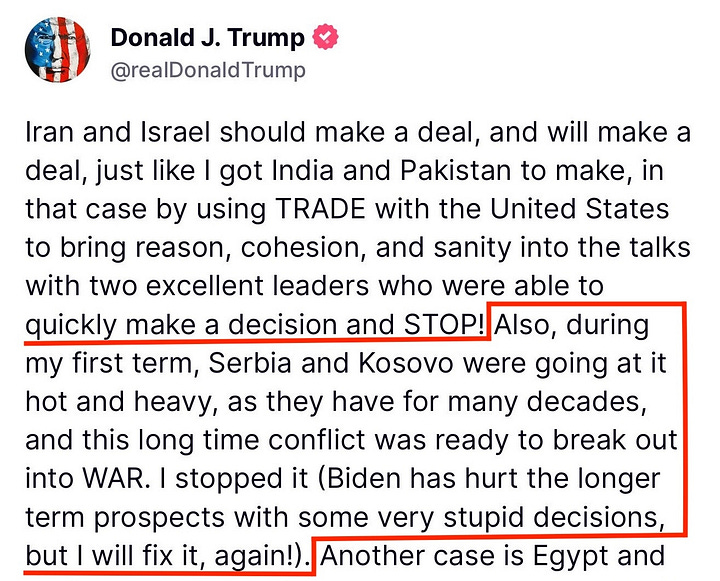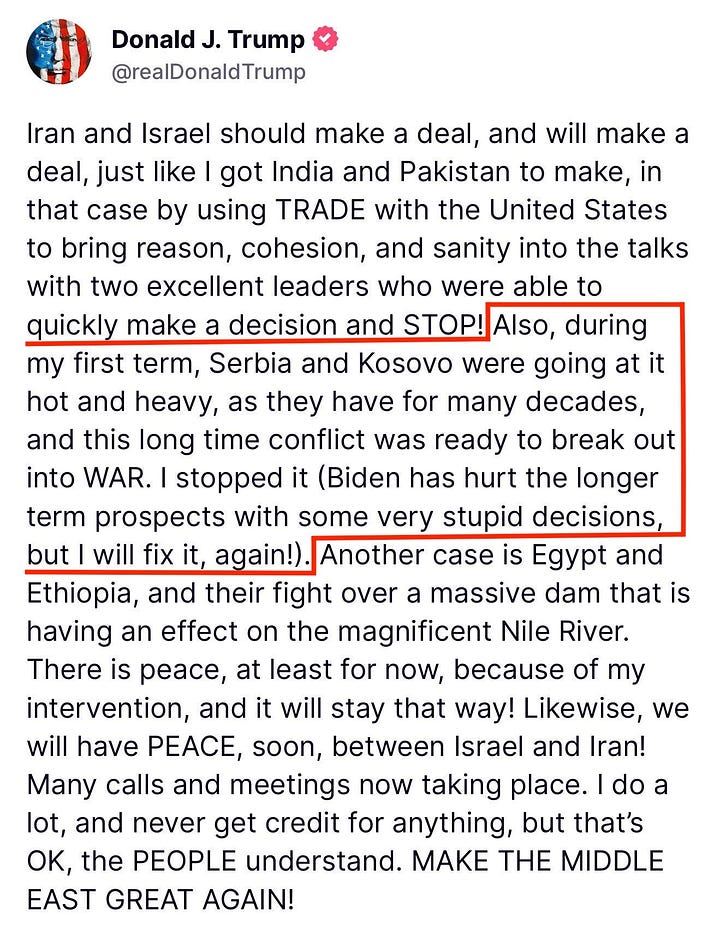Grenell Panics When Trump Speaks Through Osmani
Osmani echoed Trump’s own claim of averting war and suddenly, Grenell and Vucic panicked. Not because she lied, but because she quoted him.
WASHINGTON — In a meticulously orchestrated appearance at the Hudson Institute this July1, President Vjosa Osmani of Kosovo delivered what can only be described as a rallying cry for deepened transatlantic partnership. The Kosovo head of state did not mince words: she painted a picture of a small but resilient republic, a democracy borne of war, now ready to serve as a linchpin in a region still hostage to 20th-century ghosts. Her address was a passionate endorsement of continued American leadership, a rejection of authoritarian destabilisation, and a thinly veiled warning to those who would exploit geopolitical ambiguity to serve malign ambitions.
Yet her remarks were also a mirror reflecting the uneasy currents shaping Western policy towards the Balkans, where truths, half-truths, and performative diplomacy collide. What emerged from Osmani’s Washington visit was not only an articulate defence of Kosovo’s sovereignty but a call for clarity in a fog of misinformation. A fog that, ironically, some of the very architects of supposed peacemaking have helped create. Chief among them: Serbian President Aleksandar Vucic and former U.S. envoy Richard Grenell.
President Osmani’s message was unequivocal. Kosovo, she argued, is not a burden but a model, a state ready to join NATO, aligned in values with the United States, and poised to serve as a strategic force multiplier in an age of great power competition. She spoke of economic potential, military readiness, technological promise, and a youthful population eager to contribute. And, crucially, she warned of Serbia’s ongoing attempts at destabilisation, citing recent threats she claimed were averted only by President Trump’s intervention.
The claim, that President Trump personally prevented a Serbian escalation in Kosovo2 instantly lit a political fuse. Serbian President Vucic was swift to respond3, denying any such threat existed and casting Osmani’s remarks as falsehoods4. The rhetorical battle escalated when Grenell, Trump’s controversial former special envoy to the Kosovo-Serbia dialogue5, accused6 Osmani of manipulating the former president’s words. But such accusations merit scrutiny, particularly when weighed against the credibility of the accuser.
Richard Grenell’s record in the Western Balkans is stained by opportunism and manipulation. His tenure as special envoy was marked not by transparent diplomacy, but by covert political engineering. As documented in multiple investigations, including from the European Parliament and investigative journalists across Europe and the U.S., Grenell leveraged threats7, misinformation, and social media theatrics to topple Albin Kurti’s government in 20208, a democratically elected reformist administration9.
This was not diplomacy. It was coercion masquerading as statecraft. Grenell’s actions aligned less with the ethos of U.S. foreign policy than with the ambitions of Aleksandar Vucic10, the very figure who has laboured to undo the democratic progress made in the Western Balkans since the 1990s. It is no coincidence that Grenell received Serbia’s highest state honour barely a month after the Banjska attack11, a Serbian-backed paramilitary assault that left a Kosovar policeman dead and once again placed northern Kosovo at the epicentre of regional tension.



In attacking Osmani, Grenell attempts to rewrite the very history he helped distort. He downplays Serbia’s recent provocations, whitewashes Vucic’s record, and positions himself as a misunderstood architect of peace. But the facts are less generous. Grenell’s actions have repeatedly emboldened authoritarian actors while undermining democratic institutions. His claims of peacemaking are contradicted by his own track record of destabilisation, now compounded by disturbing revelations linking him to Russian-backed networks and undisclosed lobbying activities.
President Vucic, for his part, continues to play the double game. Publicly professing a commitment to peace and dialogue, he simultaneously undermines Kosovo’s sovereignty12 through proxies and disinformation13. His public relations campaign, carefully curated for Western audiences stands in stark contrast to his domestic rhetoric, where he lionises Slobodan Milosevic, disparages NATO, and openly courts Chinese and Russian support. The Banjska attack in 2023 was not an aberration, but a continuation of a strategy aimed at asserting de facto control over Kosovo’s Serb-majority north. Vucic’s denials ring hollow when measured against a decade of nationalist posturing and obstructionism.
So, was Osmani manipulating Trump’s words, or was she responding to a credible pattern of threats, one consistent with Serbia’s actions and Trump’s own proclamations? The answer is less conspiratorial than Grenell suggests. Trump, in various statements, has taken credit, whether rightly or not — for preventing conflict between Kosovo and Serbia. He did so again this year, telling supporters and reporters that his administration had stopped a war from erupting in the Balkans. Osmani, therefore, merely echoed the narrative already publicised by Trump himself. That Grenell would accuse her of manipulation when his own political history reads like a manual in manufactured crises is irony bordering on farce.


Osmani’s Washington address, while rhetorically sharp, was largely consistent with her country’s long-standing foreign policy orientation. Her characterisation of Kosovo as a “flawless American victory” may lack diplomatic nuance, but it is a powerful counter-narrative to the cynicism that too often defines Western discourse on intervention. Where critics see failure in Afghanistan or Iraq, Osmani sees Kosovo as proof that principled engagement can succeed if sustained.
Still, not all of Osmani’s assertions are beyond critique. Her optimism about immediate NATO accession, for instance, ignores the complex realities posed by non-recognising states within the alliance. Her suggestion that U.S. pressure could convince these states within 24 hours, though aspirational, risks trivialising the deeply entrenched political calculations of EU and NATO members like Spain and Greece. Moreover, her characterisation of Kosovo’s democracy as “flawless” is generous to a fault, particularly amid ongoing political deadlock and governance challenges.
But these are not disqualifying flaws. They are the expressions of a leader navigating a geopolitical labyrinth with limited tools, high stakes, and a restless public. Osmani’s strength lies not in presenting a perfect state, but in articulating a clear and consistent commitment to the values that underpin the transatlantic alliance: rule of law, human rights, collective security. Her critique of appeasement, particularly with regard to Vucic, is uncomfortably accurate.
At a time when American and European policy in the Western Balkans remains reactive and fragmented, Kosovo’s message as articulated by Osmani, is refreshingly strategic. It asserts that Kosovo is not a passive recipient of peace, but an active contributor. That democracy, however young, demands recognition not merely as a moral ideal but as a geopolitical asset.
President Trump now stands at a crossroads. If he genuinely believes in Kosovo’s strategic value and in the peace he claims to have brokered, he must distance himself from the discredited figures who have used his name to advance agendas antithetical to American interests. Grenell’s meddling has not strengthened American influence, it has weakened it. Vucic’s duplicity has not brought the region closer to peace, it has prolonged instability.
The path forward requires moral clarity, not performative diplomacy. It demands that the U.S., under any administration make explicit what has long been implied: that Kosovo’s sovereignty is not negotiable, and that its future lies within NATO and the European Union. Recognition is not charity. It is justice.
Kosovo does not ask to be rescued. It asks to be treated as a partner. Osmani’s words in Washington were not the fabrication Grenell suggests, but the articulation of a strategic vision long ignored. And in the din of Balkan politics, that clarity deserves not condemnation, but consideration.
That Grenell and Vucic now scramble to discredit President Osmani by portraying her as a manipulator of Trump’s own narrative reveals less about her credibility than it does about their intentions and perhaps their desperation. By casting Osmani as a threat to Trump's legacy, they are not defending it; they are baiting it. Grenell, once relegated to the diplomatic fringes, now appears to be weaponising Trump’s name to rehabilitate a foreign strongman14 who has spent the better part of a decade undermining everything the West claims to champion in the Balkans. And Vucic, ever the tactician, knows precisely how to exploit such flattery to whisper allegiance in English while fuelling anti-Americanism in Serbian. If Trump truly wishes to be remembered as a president who averted war in the Balkans, he may want to ask why his former envoy and the Balkan leader he once praised are now so eager to portray that peace as a lie. Because if Trump was the man who stopped a war, Grenell and Vucic are now trying very hard to convince the world that he never did.
The Balkan Lie Trump Believed
When President Donald J. Trump, now serving as the 47th President of the United States, took to Truth Social recently to claim he had stopped a war between Serbia and Kosovo during his first term, the statement stirred familiar echoes of his political style: grand declarations, simple solutions to complex problems, and an unyielding belief in the power of deal-making. “I stopped it,” he posted, placing himself at the center of peace efforts between two nations long entrenched in hostility. It was an assertion delivered with confidence, but not with truth.
The Balkan Lie Trump Believed
There was no war to stop, only a crisis Grenell helped create. Trump was misled, Kosovo was cornered, and Serbia celebrated. — The GPC.
Vučić reacts to Vjosa Osmani: We have not engaged any soldiers, nothing is done without the US and China knowing — INDEKS Online/RFE.
Trump's statement is reconfirmed by Osmani and denied by Vučić — KOHA Ditore.
Is Grenell Engineering Another Political Coup?
From diplomacy to disinformation, Grenell resurfaces, fuelling chaos in Kosovo’s elections with the same tactics that toppled Kurti’s government in 2020. — The GPC I Unit.
How Richard Grenell Became Kosovo’s Unofficial Opposition
Richard Grenell’s intervention in Kosovo’s elections exposes his role as a political enforcer, pushing private interests over national sovereignty under the guise of American diplomacy. — The GPC.
Grenell’s Words Stir Fears of Assassination Plot in Kosovo
Richard Grenell’s escalating rhetoric, Serbian honours, and ties to Balkan power players suggest more than diplomacy, hinting at sinister moves against Kosovo’s PM Albin Kurti. — The GPC.
How to Topple a Reformer Without Firing a Shot
Kosovo’s Prime Minister resigned to follow the law. His enemies used it to break the system. In the void, a coup bloomed quiet, legal, lethal. — The GPC.
Unmasking Serbia’s President Aleksandar Vucic — "The Exposé"
In this episode, The Exposé uncovers Aleksandar Vucic’s dangerous alliances with Russia, China and Iran, revealing Serbia’s destabilising role in Europe. Subscribe for deeper insights. — The GPC.
One Year After Banjska: The West’s Role in Serbia’s Balkan Escalation
One year after the Banjska attacks, Serbia's aggression and Western appeasement continue to destabilise Kosovo, raising questions about regional security and international accountability. — The GPC.
Zelensky’s Odessa Summit: A Stage for Surrender
Zelensky begged the West for solidarity, then bowed to Putin’s puppet. In Odessa, he didn’t defend sovereignty, he betrayed it. Kosovo excluded, Vucic applauded. — The GPC.






